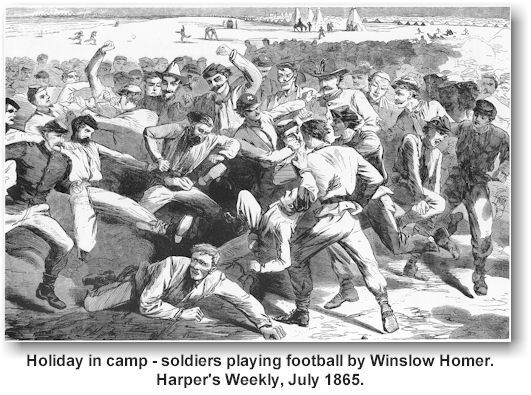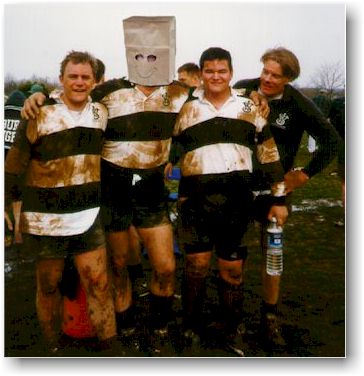
Warfare a la Mode
by Jonah Begone
All along the Potomac, life has become too predictable, easy and comfortable. Long marches, sleeping out in all kinds of weather and running around after Rebs on hot, humid summer days has become passe. So, Dear Reader, I have decided to liven things up by taking up another improbable recreational activity: rugby!
For those of you not in the know, rugby has a well-deserved reputation for being a tough game to play. A combination of soccer and "smear the queer," players are often carried off the field oozing gore or nursing fractured limbs. Some even become quadriplegic. The game was invented at the Rugby School in the 1820s when a farby 16 year old football (soccer) player grabbed the ball and ran with it. By the time the game got to the U.S. just after the turn of the century it was violent enough for Teddy Roosevelt to (uncharacteristically) require it be made safer under the threat of a national ban. The modern gridiron game of football was the result; so rugby can be described as the bastard child of soccer and the neglectful parent of football.
The editor of the CCG - whom I collegially refer to as "The Voice" (of Civil War Reenacting) - asked if there were any cultural similarities between reenacting and rugby. Of course. In conformance to Jonah Begone's First Law of Reenacting Literature - Everything Relates, or can be Made to Relate, to Civil War Reenacting - I offer up this study.
One thing I immediately noticed is that, as in reenacting, one's position in the game (or formation) is determined by one's size. Yours truly is a Homerically proportioned, 6'4" 244 pounder, which almost always means that at reenactments I'm somewhere in the very front of the column and in the back row. While there is some freedom in rugby as to where we hulking, slack-jawed monsters are put, most often we're forwards. (A notable exception is Jonah Lomu, a huge New Zealander. He's a fearsome back player who inspires bumper stickers that proclaim "Jonah Is My Man!" I want one of those, for obvious reasons.) I think the phrase "goon squad" must have been inspired by the sight of forwards, lumbering over to batter the guy with the ball. Anyway, the forwards are usually big and powerful, the backs are usually fast. Like the difference between Grenadiers and Light Infantry. The forwards usually take part in the slam bang action, the backs usually score the trys (goals).
The nearest thing to spooning in rugby is scrumming; there is nothing quite like it in sports, and it's even more, uh, personal. My job as a lock forward is to reach up between the legs of a sweaty prop (a hefty man doing a credible first person impression of an oak stump) with my left arm and grab - careful aim, there! - the waist of his shorts, the arm curling around his leg. My right arm goes around my fellow lock's sweaty back and grabs his shorts. My head goes between the hip of the prop and - shades of Fightin' Joe! - the hip of the player known as the "hooker." Two flankers bind so that they can push on the props' free buttocks, and a player designated simply as "number eight" binds in the back, pushing my buttocks. Talk about claustrophobic. My job as a lock is to shove the prop forward and maintain stability. In a match, on cue, this great heaving 1,600-plus-pound pile of humanity gets up, rams forward into an opposition scrum and grunts loudly. The scrum-half tosses the ball into this mass and, if all goes well, it exits in a predictable manner in the same way countless french fries exit the fat fryers in the concessionaire areas at events.

...which brings us to the meaning of the term "recreational." We reenactors have extended it to include sweating profusely, freezing and being made uncomfortable by sunburn, exposure and flying projectiles. Rugby has all of this and more, since you can court heat prostration by running around in shorts and a cotton jersey the same as you can by standing still in dark blue wools. The flying projectiles in rugby are humans who are out for your knees or ankles - if they're playing fair and not going for stomachs and necks. And heaven help you if you've been singled out as being an especially adept kicker, for instance, whom 15 opposing players want to take out with lovingly-planned hard tackles. Yes, it's recreational.
Then there are the bumper stickers and tee shirts, usually created by dull wits. (Reenactors have lead balls, ruggers have leather balls - you know, the same kind of enormously clever stuff created by the sorts of people who devised Big Johnson tee shirts.) But I have to give rugby credit for having an edge with more clever promotional material. A favorite tee shirt has a quote from Henry V - "Whoso sheds his blood with me on this field will be my brother." I haven't yet observed Shakespeare utilized to promote reenacting. Another favorite is "Sure 'scrum' is a funny word, but 'assault and battery' was already taken." And the rugby phrase "gentlemen hooligans" is much more truthful than all the windy commemorative rhetoric reenactors use to justify playing weekend soldier. (Perhaps we should just be more honest.) The big difference between the game and the hobby is that we reenactors go to lengths to play down the warlike attributes of reenacting battles - rugby players positively wallow in it.
While there is a material culture in reenacting - it's not unusual for people to finger each others' clothing and inquire about hand-stitching or fabric - this really doesn't extend to rugby. Everyone knows whatever you wear will be torn to shreds sooner or later, so who cares? Imagine a field full of guys outfitted by a shoddy cloth contractor and you'll have an idea of a rugby practice. Clothing prestige in reenacting is represented by all natural materials. In rugby it's with bloodstains on jerseys. (In fact, a proud day for me was getting the first bloodstains on my new team jersey. Not my own blood, mind you.)
The most obvious similarity between rugby and reenacting is, of course, that well-recognized and lovable testosterone-fueled male behavior and outlook. Some might even claim deviant male behavior, but I won't. Rugby is war. Life is war! (This viewpoint was even claimed by a contracting officer in a business meeting I once attended!) Everything relates in some way to combat, and every man or rugger is a soldier. One fellow in my club, during a practice game, was unaware he was paraphrasing a Union Army diarist speaking about charging Rebs: "Don't be afraid of them - they're only guys like us." Another described an upcoming match against some Irish (yes, they're present in rugby as well - only they don't affect bogus dialects) as "$!#@$! recreation - this is war! They're going to hurt us, we'll hurt them!", with an admonition to watch Braveheart as inspiration. The mood of the war council kept me from pointing out a certain likeness to the opening scenes in West Side Story - my puckish personality can only get away with so much - but there it was, naked male aggression. Ya gotta love it.
In fact, psychologically, rugby is more of a reenactment of battle than our reenactments of battles are. During one match I watched two players get injured rather badly - one broke his wrist and another dislocated a knee - and both were lying on the grass screaming in pain in what I initially took to be first person impressions. My match was due to kick off in about a half hour after the injured were walked and carried off the field, and it caused me to think of Civil War diarists' descriptions of having to go into battle watching the wounded streaming away in the opposite direction. The fact that we were kept waiting on the field in readiness (free to indulge our worst fears) before the other side was prepared only reinforced the comparison.
In a previous article entitled "Vandals at the Gates" (May 1998) I examined the nuisance of women intruding themselves on what used to be a male hobby, and possible remedies. Rugby, for some fairly obvious reasons concerning upper body strength, weight and aggressiveness that even the most die-hard feminist will admit, is not yet co-ed. There is women's rugby and men's rugby, and the wives and significant others who sit out and watch their boys play matches seem to be monumentally bored by it all. I asked one wife about it, and she stated that while people generally know what the rules are for football, a rugby match just looks like utter chaos and pure violence, and therefore wasn't especially entertaining. (Imagine that. Do we get the same comments about the viewing of reenacted battles?)

Boys will be boys, and they will have their beer. Now, I will be the first to admit when it comes to drinking and drunkenness I am an observer only, for many reasons. (One of them being that Papa Begone, Aunt Begone and Grandpa Begone all had lives befouled by the demon drink.) I do not drink, and many is the reenacting campfire that I have sought out fellow teetotalers for something resembling intelligent conversation around the campfire. Manliness does not equal booze in my book, and I view the morning barfing up into campfires with asperity. A beer mug, however, is something of a mystic icon to ruggers. Why, just the other night I found myself smiling during the coach's admonition to not show up on the game pitch hung over. (Talk about self-punishment.) Reenactors seem to often favor their alcohol in the form of limp-wristed aperitifs like peppermint schnapps, creme de menthe and various brandies in little flasks - I've never understood this, either.
So, are there any reenacting advantages to playing rugby? Certainly! Aside from the cardiovascular benefits, the next time a so-called "hardcore reenactor" confronts you wearing his stinky, rag-tag uniform and asks if you're man enough to spoon with him on a cold night and provide a home for shelterless lice, you can respond, "Sure - if you come out to rugby practice with me." Then you can see who's really "hardcore."
BEHIND THE BYLINE: Jonah Begone, reenacting crank, can be found on the Internet at JonahWorld! while he's not reloading, rucking, counting off, mauling, doubling or scrumming.